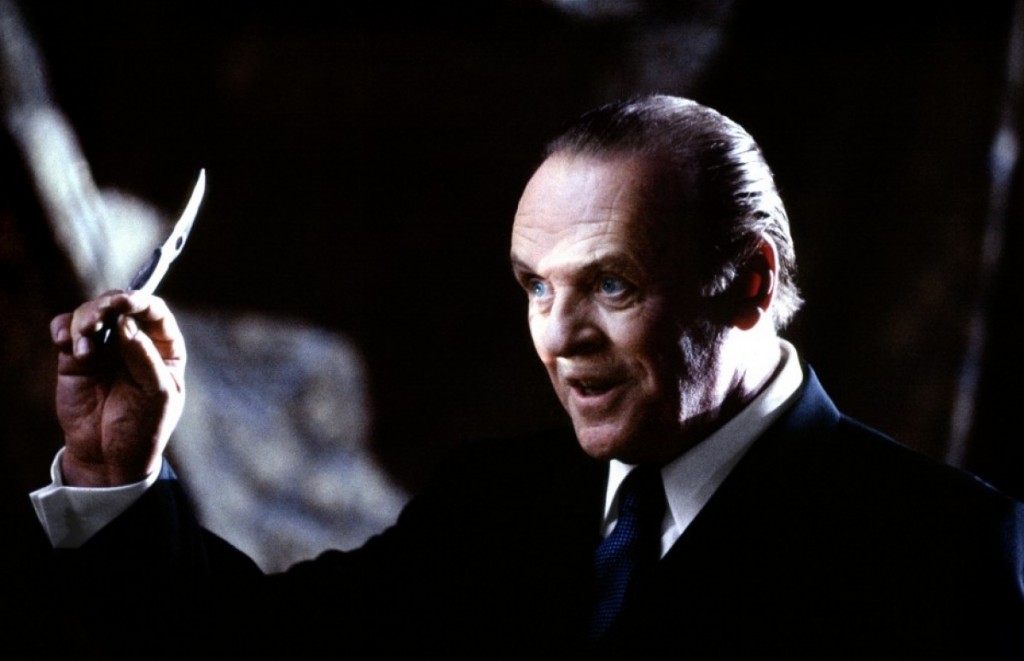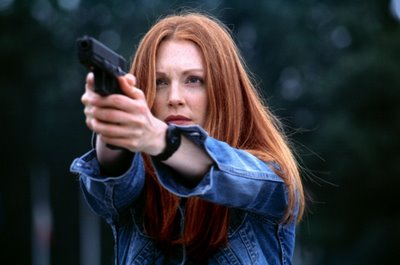Hannibal (2001)
DIRECTOR: Ridley Scott
CAST:
Anthony Hopkins, Julianne Moore, Giancarlo Giannini, Ray Liotta, Gary Oldman, Frankie Faison, Zeljko Ivanek, David Andrews
REVIEW:
As a follow-up to 1991’s Oscar-winning The Silence of the Lambs, Hannibal was one of the most anticipated movies of 2001, but its journey from Thomas Harris’ page to the screen was a tumultuous one. Early in production, Lambs‘ director Jonathan Demme dropped out, replaced by Ridley Scott. Then publicly citing schedule conflicts while privately displeased with the script, Lambs star Jodie Foster declined to reprise her role of Clarice Starling (given that she has called Clarice her favorite character, it is telling of how unimpressed with this production Foster must have been to have turned down the chance to return to it), and was replaced by Julianne Moore. David Mamet’s adaptation of Harris’ book was rejected, and the script was redone by Steven Zallian. The only Lambs veteran- other than Frankie Faison, who played Lecter’s guard Barney in Lambs and returns here in a small role- to stay onboard for Hannibal (and later also for 2003’s Red Dragon), was Anthony Hopkins in the title role of Hannibal. Considering all this behind-the-scenes turbulence and the lack of interest from Foster and others, one could expect Hannibal to be more of a hack job than it is. The final project isn’t equal to The Silence of the Lambs but it’s more engaging and stylish than Red Dragon, and provides two hours of darkly engrossing entertainment.
We start with a disastrous FBI drug raid led by Clarice Starling (Julianne Moore), that ends in a bloody shootout and five dead. Out of her superiors’ good graces due to the controversial episode, Clarice is tossed a chance to salvage her career by Mason Verger (an uncredited and unrecognizable Gary Oldman), Hannibal’s only surviving victim, a horribly disfigured but wealthy and politically-connected former child molester who pulls some strings to get her reassigned to the cold Hannibal Lecter case. Verger has a gruesome revenge planned for the good doctor involving a herd of wild boars, and hopes to use her as a pawn to find him. Verger’s offer of a $3 million reward also interests an Italian cop, Pazzi (Giancarlo Giannini), who has discovered Hannibal living under a false identity as a museum curator in Florence but doesn’t know what he’s getting into, and Paul Krendler (Ray Liotta), a superior of Clarice’s intent on railroading her career.
 One clear quality Ridley Scott brings to Hannibal is a sense of style. Jonathan Demme permeated The Silence of the Lambs with a claustrophobic, ominous sense of danger and unease. Hannibal‘s feel is completely different, but equally pervasive. Scott takes good advantage of the fact that much of the movie takes place in Florence, bringing gothic tones and moments of stylish flair, such as when Hannibal walks directly past the camera, long coat billowing in the wind behind him. But the biggest attribute of Lambs, psychological depth, is nowhere to be seen here. It’s not hard to see why Jodie Foster wasn’t interested in reprising Clarice; the Clarice here isn’t given a chance to show anything near the complexity and dimension the character was invested with in Lambs. The only reason we see her as a fully-formed character is because we got to know her so inside and out in Lambs. As for Hannibal, who was never really originally intended to be the central figure of the story but has become far and away the most iconic character and is now front and center as the main attraction, few would deny that he is the most engaging character onscreen, with his cunning, cultured intelligence and suave menace. But elevating Hannibal to the lead role also takes away a little of the sense of evil that clung to him so powerfully in Lambs. Hannibal the movie invites us to like Hannibal the character a little more than Lambs allowed. Toward the end a situation unfolds in which he and Clarice are forced to briefly and uneasily team up, and despite the trail of unspeakably heinous crimes he leaves behind him, most will at least grudgingly admit to hoping he gets away in the end. He’s too good a character to be blown away in some climactic shootout.
One clear quality Ridley Scott brings to Hannibal is a sense of style. Jonathan Demme permeated The Silence of the Lambs with a claustrophobic, ominous sense of danger and unease. Hannibal‘s feel is completely different, but equally pervasive. Scott takes good advantage of the fact that much of the movie takes place in Florence, bringing gothic tones and moments of stylish flair, such as when Hannibal walks directly past the camera, long coat billowing in the wind behind him. But the biggest attribute of Lambs, psychological depth, is nowhere to be seen here. It’s not hard to see why Jodie Foster wasn’t interested in reprising Clarice; the Clarice here isn’t given a chance to show anything near the complexity and dimension the character was invested with in Lambs. The only reason we see her as a fully-formed character is because we got to know her so inside and out in Lambs. As for Hannibal, who was never really originally intended to be the central figure of the story but has become far and away the most iconic character and is now front and center as the main attraction, few would deny that he is the most engaging character onscreen, with his cunning, cultured intelligence and suave menace. But elevating Hannibal to the lead role also takes away a little of the sense of evil that clung to him so powerfully in Lambs. Hannibal the movie invites us to like Hannibal the character a little more than Lambs allowed. Toward the end a situation unfolds in which he and Clarice are forced to briefly and uneasily team up, and despite the trail of unspeakably heinous crimes he leaves behind him, most will at least grudgingly admit to hoping he gets away in the end. He’s too good a character to be blown away in some climactic shootout.
Hannibal is also not as tightly-plotted as The Silence of the Lambs, which recognized that the relationship between Clarice and Hannibal was the key dramatic center of the movie. Here, Clarice and Hannibal interact only fleetingly and indirectly until the final third or so of the movie, and a hefty portion of the running time until then is spent following Pazzi around Florence (a storyline we just know is not going to end well). While this generates some suspenseful scenes, Pazzi is an extraneous character, and it seems a little odd to spend so much time on him that could have been used doing something with Clarice and Hannibal. In fact, while his revenge plot drives the storyline, even Mason Verger, in the end, is a temporary distraction who occupies time until we get to what we really want to see, Clarice and Hannibal face to face. It’s not that any of the stuff involving Pazzi or Verger is unengaging; in fact it makes up the bulk of the film, and is entertaining enough to keep us from fidgeting impatiently for some kind of Clarice-Hannibal encounter. But in the end, despite the excess of supporting characters with inordinate screentime wandering around, Clarice and Hannibal are the only ones who really matter. Everything else is filler; their climactic third act confrontation under the same roof is the meat.
 Anthony Hopkins is deliciously evil as Hannibal, and seems to relish returning to his iconic role. When he puts his mind to it, there is no one to match Hopkins for being right on the line between cultured charm and unnerving menace. We might find Hannibal witty and urbane, but we don’t want to spend too much time alone with him. Hopkins is creepy- not at the same level of penetrating dread as in The Silence of the Lambs, but still capable of raising the nape hairs. While Hannibal doesn’t have the depth of The Silence of the Lambs, Hopkins is a good enough thespian in a role he obviously enjoys to be worth watching every second he is on the screen. Another cast member who seems to be having fun is Gary Oldman, who leaves his eccentric, over-the-top mark on Mason Verger even while buried unrecognizably under grotesque makeup. Jodie Foster had much meatier material to work with, but Julianne Moore probably does about as well as anyone could have replacing her as Clarice Starling. Clarice, as we catch up with her ten years later, is more experienced, tougher, and less vulnerable than where we left her in Lambs, and while she’s not given a chance to match Foster’s depth and complexity, Moore does a solid job stepping into her shoes. Giancarlo Giannini does his slouching sadsack thing as the ill-fated Pazzi, and Ray Liotta is suitably sleazy as Paul Krendler.
Anthony Hopkins is deliciously evil as Hannibal, and seems to relish returning to his iconic role. When he puts his mind to it, there is no one to match Hopkins for being right on the line between cultured charm and unnerving menace. We might find Hannibal witty and urbane, but we don’t want to spend too much time alone with him. Hopkins is creepy- not at the same level of penetrating dread as in The Silence of the Lambs, but still capable of raising the nape hairs. While Hannibal doesn’t have the depth of The Silence of the Lambs, Hopkins is a good enough thespian in a role he obviously enjoys to be worth watching every second he is on the screen. Another cast member who seems to be having fun is Gary Oldman, who leaves his eccentric, over-the-top mark on Mason Verger even while buried unrecognizably under grotesque makeup. Jodie Foster had much meatier material to work with, but Julianne Moore probably does about as well as anyone could have replacing her as Clarice Starling. Clarice, as we catch up with her ten years later, is more experienced, tougher, and less vulnerable than where we left her in Lambs, and while she’s not given a chance to match Foster’s depth and complexity, Moore does a solid job stepping into her shoes. Giancarlo Giannini does his slouching sadsack thing as the ill-fated Pazzi, and Ray Liotta is suitably sleazy as Paul Krendler.
Despite a gruesome moment here and there, Lambs was actually rather restrained in its gore, relying more on atmosphere and psychological chills. Hannibal, on the other hand, dives right in with grotesque glee. It would be exaggerating to say that the movie is a neverending gorefest, but what gross-out moments there are are doozies- even if you don’t remember the man who cuts off his own face and feeds it to his dog, or the luckless cop who literally spills his guts for Lecter, you won’t easily forget the climactic dinner in which a man is fed pieces of his own brain. The infamous dinner scene in particular runs right along and probably crosses the line from being grotesquely disturbing to over-the-top campy ultra-violence.
But if Hannibal isn’t anything deep on a psychological level the way The Silence of the Lambs was, nor deserving of the Oscars Lambs received, it’s certainly never boring, and Scott deserves much of the credit for taking material that could have come out ridiculous and using a strong sense of style to weave it into a darkly hypnotic ride of macabre imagination. It’s an expertly-crafted film, often gorgeous to look at, competently-acted, and the best of its scenes occasionally rival the dark, sinister feel of Lambs.
***